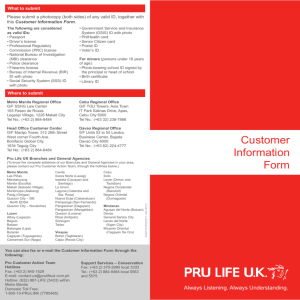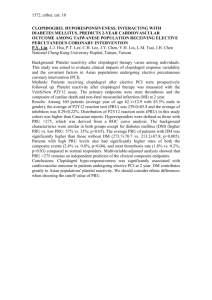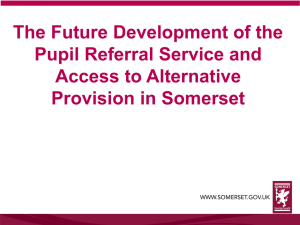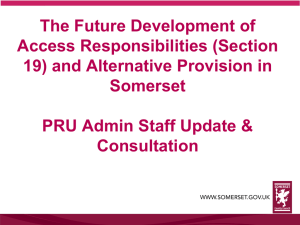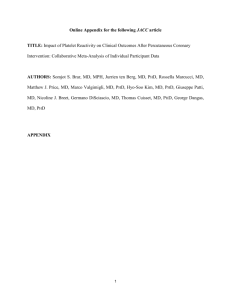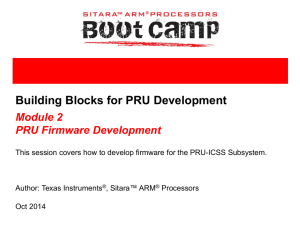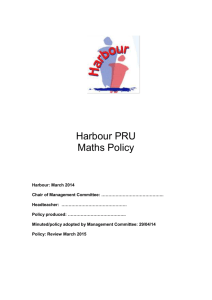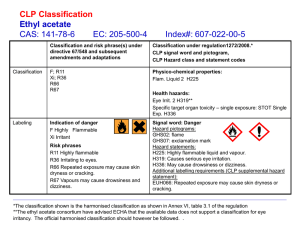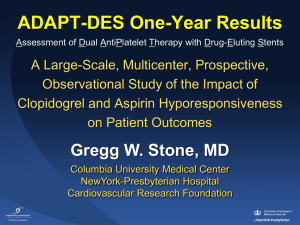Pupil referral unit entry criteria
advertisement
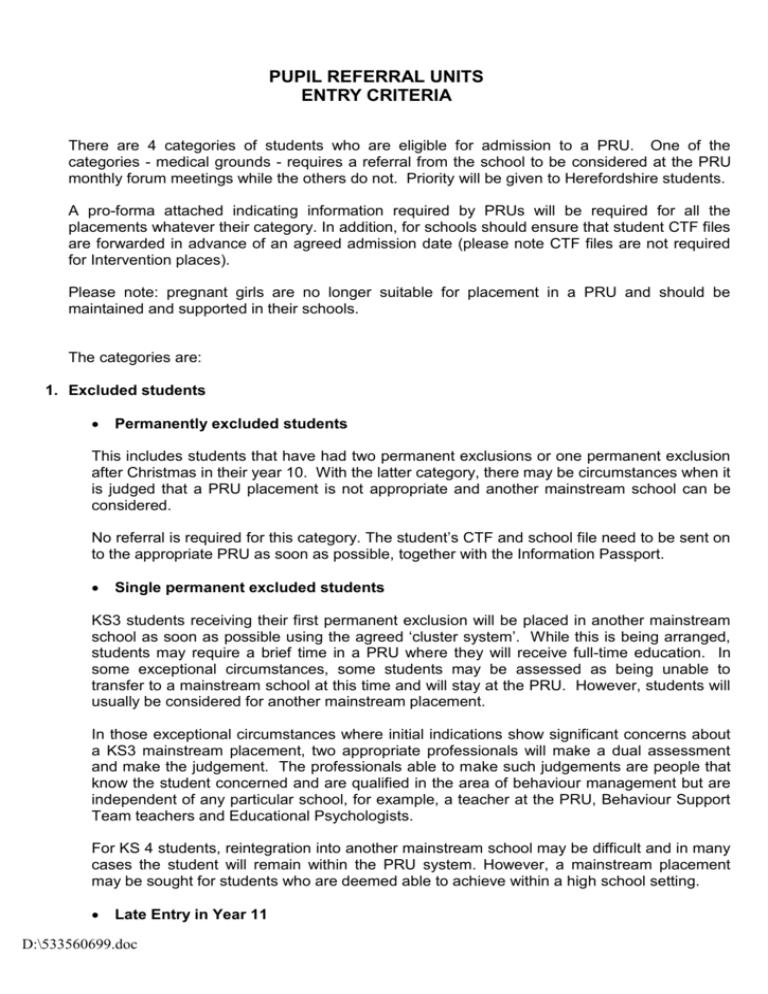
PUPIL REFERRAL UNITS ENTRY CRITERIA There are 4 categories of students who are eligible for admission to a PRU. One of the categories - medical grounds - requires a referral from the school to be considered at the PRU monthly forum meetings while the others do not. Priority will be given to Herefordshire students. A pro-forma attached indicating information required by PRUs will be required for all the placements whatever their category. In addition, for schools should ensure that student CTF files are forwarded in advance of an agreed admission date (please note CTF files are not required for Intervention places). Please note: pregnant girls are no longer suitable for placement in a PRU and should be maintained and supported in their schools. The categories are: 1. Excluded students Permanently excluded students This includes students that have had two permanent exclusions or one permanent exclusion after Christmas in their year 10. With the latter category, there may be circumstances when it is judged that a PRU placement is not appropriate and another mainstream school can be considered. No referral is required for this category. The student’s CTF and school file need to be sent on to the appropriate PRU as soon as possible, together with the Information Passport. Single permanent excluded students KS3 students receiving their first permanent exclusion will be placed in another mainstream school as soon as possible using the agreed ‘cluster system’. While this is being arranged, students may require a brief time in a PRU where they will receive full-time education. In some exceptional circumstances, some students may be assessed as being unable to transfer to a mainstream school at this time and will stay at the PRU. However, students will usually be considered for another mainstream placement. In those exceptional circumstances where initial indications show significant concerns about a KS3 mainstream placement, two appropriate professionals will make a dual assessment and make the judgement. The professionals able to make such judgements are people that know the student concerned and are qualified in the area of behaviour management but are independent of any particular school, for example, a teacher at the PRU, Behaviour Support Team teachers and Educational Psychologists. For KS 4 students, reintegration into another mainstream school may be difficult and in many cases the student will remain within the PRU system. However, a mainstream placement may be sought for students who are deemed able to achieve within a high school setting. Late Entry in Year 11 D:\533560699.doc For Key Stage 4 a student starting at a PRU from November in Year 11, the expectation is that the referring school will continue to enter the student for their examinations (possibly as an external candidate). The PRU will support the student to complete their studies. Students may take their examinations at the PRU if it is not reasonable for them to take the examinations at the referring school. The head of the PRU will work closely with a designated teacher from the referring school in order to minimise the negative effect of a late transition to the PRU system. 2. Medical grounds This is for students that present serious medical conditions confirmed by either an Educational Psychologist or a Psychologist or Psychiatrist from the Linden Centre (CAMHS). Schools should be clear that this referral route is only appropriate where a student’s psychological/medical condition prevents them from being able to access school. The vast majority of students with medical conditions have their needs met effectively in schools which are able to cater to the individual needs of these students either by utilising internal support, or through the process of banded funding or statutory assessment. Example Students that would qualify under this category would be those with severe medical conditions preventing them from accessing school. Examples of such conditions include severe clinical depression or school-phobia. Students with emotional and behavioural needs do not qualify under this category; school should work with internal support system and external agencies to meet their needs. It should be noted that this referral route is not usually appropriate where students have a statement of special educational needs or are in the process of going through statutory assessment. Schools should complete the Information passport and attach a written report from the psychologist/psychiatrist supporting the referral. There is an expectation that schools will have evidence of support and preventative measures used prior to requesting a PRU placement. This service is part of the provision at St David’s Centre and provides for all ages of children across the County. To access the service, the school needs to complete an Information Passport, and together with a letter from a medical consultant these should be sent to the Medical Short-Stay Senior Teacher, c/o St David’s Centre. Depending on the needs of the individual student and the detail of the referral letter, provision will usually be attendance at the hospital class within the County Hospital or tuition within the home. Alternatively, the case could be considered at the PRU Forum if a place in the Aconbury, Priory or St David’s Centre is deemed appropriate. NB. In practice a consultant letter (CAMHS) is the first part of the referral and HHTT contacts the school for an Information passport. Meetings with a representative from CAMHS are held every half term to discuss individual children’s care and education plans. D:\533560699.doc Students that attend a PRU through this route will usually be dual registered and may, at some point, be able to return to their original school. 3. Intervention Support at KS3 Aconbury and KS4 The Priory PRUs These placements are designed to give support to students struggling in their schools. Intervention placements at The Aconbury Centre and The Priory Centre offer a range of packages, including short-term/part-time/full-time support. All students should be subject to a Pastoral Support Programme. It is expected that a CAF or CAF Pre-Assessment Checklist is in place. The Information passport needs to be completed for all referrals for intervention places. Intervention places are arranged through discussion with the relevant Headteachers. It should be noted that these places are available only when capacity permits. Intervention placement students remain on roll of the school and should attend their school when not at the PRU. At the end of the intervention placement, students will return to full-time attendance at their school. Wherever possible, a member of staff from the PRU will meet with school staff to advise on behaviour management strategies. The success of these placements relies upon regular communication between key staff within the high school and PRUs. 4. Exceptional circumstances The Executive Headteacher of Behaviour, in partnership with the Head of Additional Needs, reserves the right to directly place a student in a PRU. However, this will only be used in exceptional circumstances. In these cases the Head of Service may agree to the student being placed in a PRU. These cases are likely to be unexpected placements of LAC or other students placed in the county who require a specialist setting. The In-year Fair Access protocol aims to place students who are out of school and the most vulnerable students in Herefordshire who are unlikely to achieve positive outcomes within a high school setting. Recommendation for a PRU place needs to be made via this panel with a completed Information Passport sent to the PRU forum. 5. Costing for PRU placements Schools will be charged £3000 per annum to add to the base PRU budget that comes from DSG. This will cover the cost of 25-hour provision per week until the student leaves school. Agreed at the PRU Forum on 28th February 2013 Version: March 2013 D:\533560699.doc
